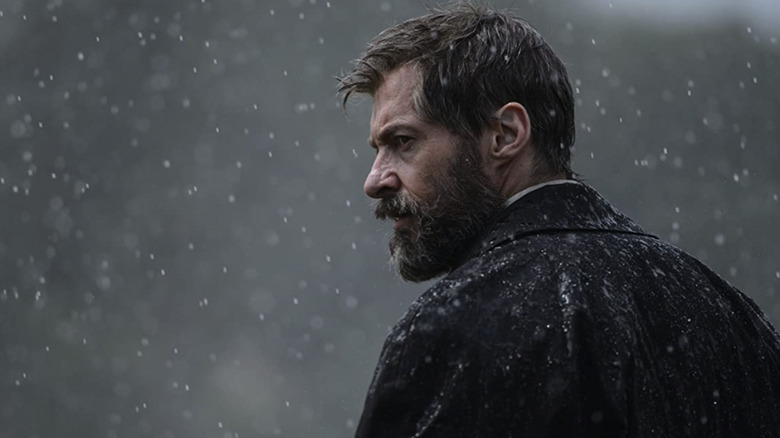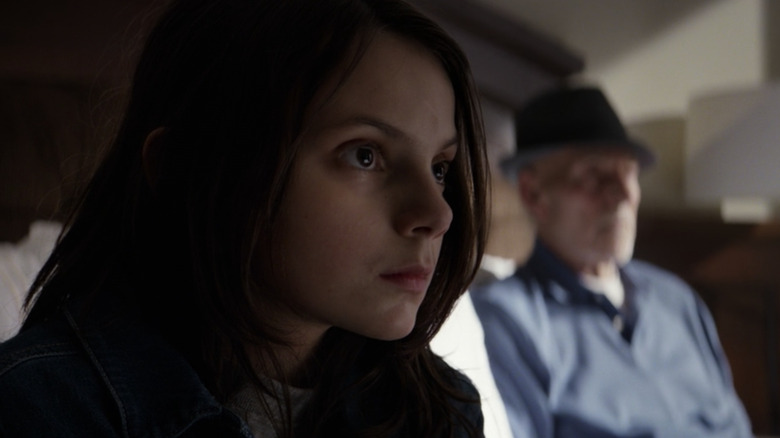The Beloved Movies That Inspired Hugh Jackman's Logan Performance
James Mangold's "Logan" wears its Western influences on its sleeve. The movie marked the ninth and final time (counting cameos) that Hugh Jackman would appear as Logan, also known as Wolverine, the X-Men character with adamantium claws. Jackman was pushing 50 when the film went into production, and in the movie, Logan himself is showing signs of age as his healing factor breaks down.
There's a scene in "Logan" in which Patrick Stewart's character, Charles Xavier (formerly known as Professor X), watches the Western "Shane" on a big-screen TV in the Oklahoma City hotel room he shares with Logan and Laura (Dafne Keen). "This is a very famous picture, Laura," he says. "It's almost a hundred years old ... I first saw this picture at the Essoldo Cinema in my hometown when I was your age."
That's just one example of how "Logan" openly trumpets its influences. The relationship between Logan and Laura corresponds with that of Shane, the gunfighter played by Alan Ladd, and Joey, the boy he befriends in that 1953 movie. Mangold has also cited both John Wayne and Johnny Cash as influences on "Logan." Like Ladd, Wayne is another major figure from the Golden Age of Hollywood — perhaps the quintessential cowboy. Cash, meanwhile, was famous for his country western music persona, and his song, "The Man Comes Around," plays over the closing credits of "Logan."
Speaking to USA Today at the time of the film's release, Mangold said:
"What I love about Wolverine is this sense of a man trapped. He doesn't really want to be a superhero, unlike these other cats who are always getting dressed up and jumping around and shining their logo in the clouds. He doesn't want the celebrity or the credit or the adoration. There's a ton of shame on his back."
Beyond Shane and Cash: Unforgiven and The Wrestler
As for Jackman, he was inspired by Clint Eastwood's Oscar-winning anti-Western, "Unforgiven," which, in turn, was inspired on a script level by Martin Scorsese's Oscar-nominated vigilante film, "Taxi Driver." The actor told USA Today how "Unforgiven" "slightly subverted Clint's history and what people knew and expected of him."
Another non-Western influence Jackman drew from was Darren Aronofsky's "The Wrestler." After "X-Men: The Last Stand," the conclusion of the original "X-Men" trilogy, Jackman worried that he was getting typecast and he was ready to quit the franchise. Working with auteurs like Aronofsky reinvigorated him and encouraged him to keep going, since it was clear there was life for him beyond Wolverine after all.
As "Logan" was gearing up to commence principal photography, Jackman looked back about ten years earlier to "The Wrestler," which teamed his old director Aronofsky with Mickey Rourke and helped revive Rourke's career. For Jackman, the appeal of "The Wrestler" was that it showed another aging protagonist who "still has his desires and ambitions but the weight of everyday life and his past seem to be getting the better of him."
Like Christopher Nolan's "The Dark Knight," "Logan" is one of the few superhero films to have earned an Academy Award nomination in one of the major, non-technical categories: It picked up a nom for Best Adapted Screenplay. The film arguably transcends the superhero genre, and perhaps one of the secrets to its success is that it looked outside the genre to other classic films for inspiration.

